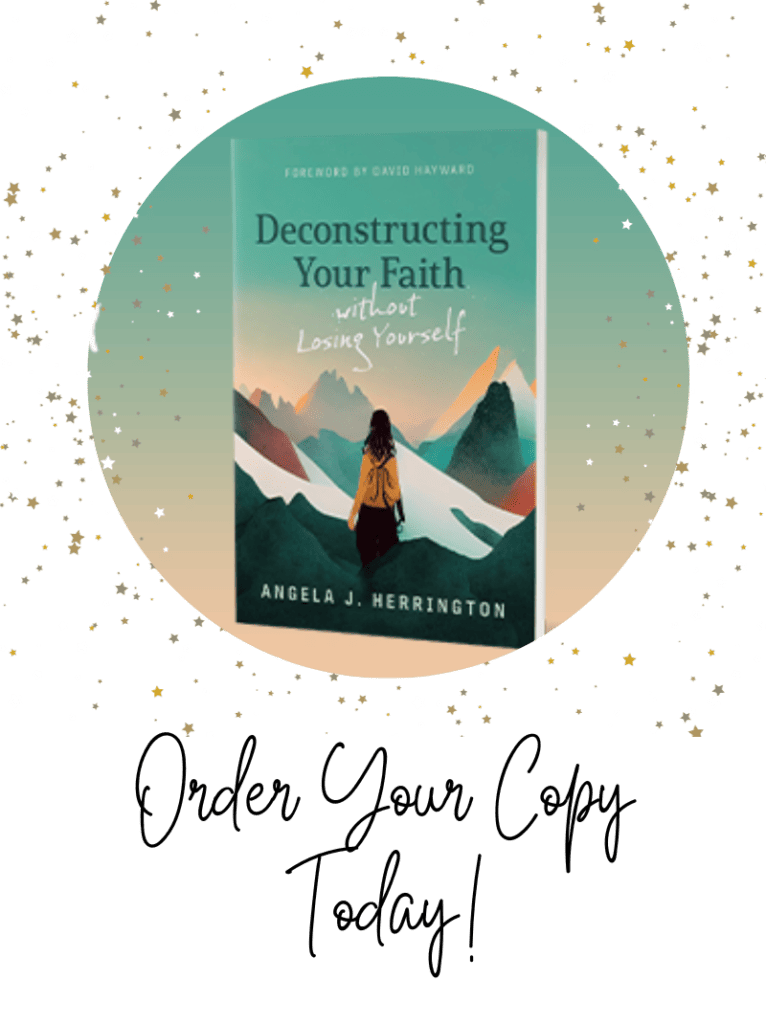We recently had a fantastic conversation in the Christian Women Who Lead group about whether or not we call ourselves feminists.
As you might imagine, a group of 7000 women on 6 continents had diverse opinions, concerns, and beliefs. Some embrace feminism, while some believe they are but stay away from the term because the meaning is so varied. Others felt strongly that feminism and faith don’t mesh up.
If you were one of the women who responded, please know this article isn’t to shame or judge your response. (None of those are biblical responses to the healthy conversation we had.) Instead, I see this as an opportunity to provide additional facts, context, and resources without overwhelming the group thread with my thoughts.
“People often silence themselves, or “agree to disagree” without fully exploring the actual nature of the disagreement. It’s for the sake of protecting a relationship and maintaining connection. But when we avoid certain conversations, and never fully learn how the other person feels about all of the issues, we sometimes end up making assumptions that not only perpetuate but deepen misunderstandings, and that can generate resentment.”
― Brené Brown, Braving the Wilderness: The Quest for True Belonging and the Courage to Stand Alone
Several common themes emerged from the individuals who understandably avoided the term or felt feminism was unbiblical. Even if you have ZERO desire to call yourself a feminist or identify with the movement, I encourage you to keep reading and take all of these words to God. I hope you’ll agree that understanding these myths (and their corresponding truths) is crucial to healing the hostility within the church that threatens our ability to reach people with the gospel.
I appeal to you, brothers, to watch out for those who cause divisions and create obstacles contrary to the doctrine that you have been taught; avoid them. For such persons do not serve our Lord Christ, but their own appetites, and by smooth talk and flattery they deceive the hearts of the naïve. – Romans 16:17-18, ESV
If we are going to survive 2020’s political jousting, then we need to stop dehumanizing. We must begin looking for common ground with those we have been taught are our opponents. It all starts with breaking down the walls we put up when we make assumptions about others.
Let’s jump into the 5 things Christians get wrong about feminism, and the Biblical truth about them!
#1 Feminism is about women taking power over men
The most common objection I hear to feminism is that the entire movement is about women rising up. Conquering. Suppressing men. Many feel very strongly that flipping the hierarchy so that women are on top isn’t the way the world should be. I agree 100%. Christians are never called to oppress others, even when it is culturally permissive to do so.
But feminism itself doesn’t promote oppression. The Oxford Dictionary defines feminism as “Advocacy of equality of the sexes and the establishment of the political, social, and economic rights of the female sex; the movement associated with this1“. The feminist fight is for equality, not to become the oppressor. This is 100% in line with a Christian faith that equally values God, Jesus, and Holy Spirit.
fem·i·nism
/ˈfeməˌnizəm/
noun
Advocacy of equality of the sexes and the establishment of the political, social, and economic rights of the female sex; the movement associated with this.
#2 Feminism is not biblical
If we use the true definition of feminism (equality, not oppressing men) then it is 100% biblical. We should hunger for men and women to have equal value, authority, and ability to self-govern. Not what people taught you the Bible says about men and women? That’s not surprising. Bible translators for the last several centuries have typically been European (white) men steeped in patriarchal culture. It would have been nearly impossible for the modern Bible translations not to reflect their deeply embedded bias. To make matters worse, older versions of the bible texts were not readily available to all.
But now, things are different. We do have virtual access to multiple translations, original documents, and a whole slew of research from biblical scholars to help us better understand the original text.
There are hundreds of passages we could dive into but in the interest of time let’s start at the beginning. Genesis. The creation of humanity. Perhaps no other passage has been twisted to support the patriarchal and fundamentalist narrative more than Genesis 2. In the original text we read God created woman as the man’s “ezer kenegdo”, or what Rachel Held Evans described as the “a helper of the same nature2″. There’s no implication of a God-created hierarchy, or that He gave greater spiritual authority to man or woman.
“Kenegdo literally means “as in front of him,” suggesting that the ezer of Genesis 2 is Adam’s perfect match, the yin to his yang, the water to his fire—you get the idea. Everything about this descriptor implies mutuality and harmony, and it provides us with a lovely glimpse of what a sinless relationship between a man and a woman might look like, the picture of a true partnership.” – Rachel Held Evans3
By contrast, patriarchy, “a society, system or country that is ruled or controlled by men”4 does go against God’s original declaration of equality between men and women.
#3 Feminism destroys families and marriage
It makes sense that if we learned to believe the previous myths about Christian feminism, then this one would follow. But now we’ve picked those apart and presented biblical truth that stands against them. Likewise, I hope you can see how this one quickly falls apart.
To create a godly marriage and/or family, we need to prioritize our individual connection with God and the pursuit of all things holy. This includes equality between the genders.
God not only created us in the likeness of the trinity, They leveled the playing field so that we all have equal standing in His eyes. (((Sidebar – Can we just call out how ridiculously counter cultural that was in Jesus’ time? In both the Old and New Testament we read stories of exceptional women rising to meet their anointing. Even when the religious, political, and social structures hindered and oppressed them. 2000+ years later we are still trying to untangle ourselves from patriarchy’s toxic hold on the church. But in most countries, we have come a long way baby.)))
That level playing field is central to creating a Christian home that honors all things holy. Mutual submission to God and each other. Loving our spouse and children as ourselves. An “exchanging power for oneness”5 as Christ did for the church. Feminism in the home does not ask if one person can accumulate more power because of their gender; it asks if any person should have more power because of their gender.
So in Christ Jesus you are all children of God through faith, for all of you who were baptized into Christ have clothed yourselves with Christ. There is neither Jew nor Gentile, neither slave nor free, nor is there male and female, for you are all one in Christ Jesus.
– Galatians 3:26-28, NIV
And if we read our bibles carefully and work really hard to set aside the patriarchal bias that has been cultivated within most of us, it’s easy to see that the bible supports, and even promotes, the call for equality in the home.
#4 Feminism is all about hate, anger, and lashing out
This misunderstanding is fueled every time we see a clip of protestors chanting. Of people angrily ranting on social media. Or when we encounter someone who feels like the camel who has had a million straws dropped on their weary back and can’t hold it in any longer.
Feminists get angry, but not everyone who is angry is a feminist.
Every single person feels anger and, at least at birth, has the ability to express that anger. Early in our lives, many women (especially Christian women) are taught that anger is a bad emotion. That anger is offensive to God and therefore, needs to be stifled. The status quo teaches us to tolerate injustices pointed at us and submit to those in authority at the cost of our own safety.
But the bible doesn’t back that up. It warns us not to lash out in anger (Proverbs 29:11) or act foolish because someone stepped on our ego (Proverbs 14:3); but anger isn’t the issue. It’s what we are mad about and who we vent that anger onto.
Therefore, having put away falsehood, let each one of you speak the truth with his neighbor, for we are members one of another. Be angry and do not sin; do not let the sun go down on your anger, and give no opportunity to the devil. – Ephesians 4:25-27, ESV
Anger against oppression is righteous. We should be mad about things that stand in direct opposition to the two greatest commandments. Elevating ourselves because of our gender, race, ethnicity, education, immigration status, wealth, faith, or a host of other shady reasons is not “loving our neighbor as ourselves” . And it certainly isn’t honoring God’s call to righteous anger.
“No matter how reprehensible the people or activities we’re condemning, we still aren’t justified to sin in our responses: “When you are angry, do not sin, and be sure to stop being angry before the end of the day” (Ephesians 4:26, NCV). Those of us with confrontational personalities might want to ask ourselves the question, Is my motive to be right or to be righteous? before ripping into the offending parties.” – Lisa Harper6
The throttling down of a normal human emotion creates a tremendously deep well of unresolved hurt, resentment, and anger. We see the years of unreconciled emotions boiling to the surface in the face of increasing political rhetoric. It throws more weight behind the toxic religious culture that oppresses healthy relationships with our emotions (and each other).
So yes, feminists (like every human) get angry. But (just like every human), it shouldn’t be an unholy, irrational anger that recklessly lashes out at everyone and everything.
#5 Feminism promotes abortion
If the last few election cycles have taught us anything it’s that Christians care deeply about the unborn. Anti-abortion candidates sway voters by calling out anyone who believes the constitution supports Roe v. Wade or believes the way to lower abortions isn’t through the Supreme Court.
The solution to abortion is messy, because our view of gender, sex, pregnancy, and motherhood is deeply connected to patriarchal norms that devalue women. Rather than debating whether the loss of unborn lives is good (which I’m confident the majority of us agree it isn’t), I want to guide this conversation towards whether being pro-abortion is a core belief of feminism.
In short – It isn’t.
The right to not be governed differently because of the perceived value of our gender is a core belief. That’s not the same as promoting abortion.
Remember, feminism is about equality, including the autonomy to govern our own bodies as men do. God gave us free will and this certainly falls under that right. Legally, this includes during pregnancy and to some extent choosing the impact we have on our unborn children.
“Abortion is a reflection that our society has failed to meet the needs of women. We are dedicated to systematically eliminating the root causes that drive women to abortion—primarily lack of practical resources and support—through holistic, woman-centered solutions.”
– Feminists for Life7
There are certainly feminists who have no quarrel with the practice of abortion. However, that is a personal choice and not a requirement of one being feminist. True feminism, the fight for equal treatment of all genders, seeks to eliminate the discriminatory (often racially and socioeconomically motivated) “multiple, diverse, and often interrelated reasons”8 women choose, or are pressured into, an abortion. There is nothing more biblical than joining the fight to root out the gender-based oppression that threatens the lives of unborn children and their mothers.
This is how we’ve come to understand and experience love: Christ sacrificed his life for us. This is why we ought to live sacrificially for our fellow believers, and not just be out for ourselves. If you see some brother or sister in need and have the means to do something about it but turn a cold shoulder and do nothing, what happens to God’s love? It disappears. And you made it disappear. – 1 John 3:17-20, The Message
It’s a valid concern that labeling yourself a feminist may prompt misunderstandings. Still, God cares less about what we call ourselves and more about how we show up for the world. Feminism, like every fight against oppression, should challenge us to dig deep into our relationship with God and The Word to better understand how our perspective may be touched by ungodly bias.
References
1https://www.oed.com/view/Entry/69192?redirectedFrom=feminism
2 https://rachelheldevans.com/blog/mutuality-adam-eve
3 https://rachelheldevans.com/blog/mutuality-adam-eve
4https://www.oxfordlearnersdictionaries.com/us/definition/english/patriarchy
6 https://www.christianitytoday.com/biblestudies/bible-answers/theology/righteousanger.html
7 https://www.feministsforlife.org/can-you-really-be-a-feminist-and-pro-life/
8https://www.guttmacher.org/sites/default/files/pdfs/pubs/psrh/full/3711005.pdf

Angela is a Faith Deconstruction Coach and host of The Deconstructing Faith Summit who helps people break free from toxic religious culture & empowers them to recover from #churchhurt. She has led online ministries for a decade, enjoys working with clients 1:1, in groups, and is a dynamic conference speaker. She’s a Lark’s Song Certified Life Coach who reaches thousands of people in 40+ countries each month on Facebook, IG, Twitter, Pinterest, and her blog.
She’s a firstborn, Enneagram 8, Gen Xer who loves to question everything. She holds a BA from Indiana Wesleyan and a Masters in Leadership from Wesley Seminary. Her graduate research project focused on leadership development and opportunities for Gen X women in the US church.
Angela and her unique online ministry are featured in Lyz Lenz’s 2019 book God Land: Story of Faith, Loss, and Renewal in Middle America. She has published articles in Hope for Women and HOPE is Now magazines. She has been featured in The New Republic, Publisher’s Today, and Religion News Service.
Her first book, Deconstructing Your Faith Without Losing Yourself, Will be published by Eerdmans in February 2023.
Angela is also a wife, mom to 5, and a proud resident of Marion, Indiana with her family when they’re not traveling the US in their RV.





